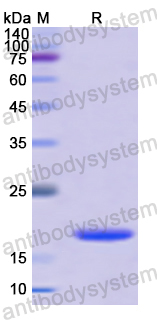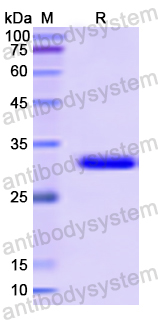Catalog No.
YHF69801
Expression system
E. coli
Species
Homo sapiens (Human)
Protein length
Met1-Leu140
Predicted molecular weight
18.17 kDa
Nature
Recombinant
Endotoxin level
Please contact with the lab for this information.
Purity
>90% as determined by SDS-PAGE.
Accession
P78560
Applications
ELISA, Immunogen, SDS-PAGE, WB, Bioactivity testing in progress
Form
Lyophilized
Storage buffer
Lyophilized from a solution in PBS pH 7.4, 0.02% NLS, 1mM EDTA, 4% Trehalose, 1% Mannitol.
Reconstitution
Reconstitute in sterile water for a stock solution. A copy of datasheet will be provided with the products, please refer to it for details.
Shipping
In general, proteins are provided as lyophilized powder/frozen liquid. They are shipped out with dry ice/blue ice unless customers require otherwise.
Stability and Storage
Use a manual defrost freezer and avoid repeated freeze thaw cycles. Store at 2 to 8°C for frequent use. Store at -20 to -80°C for twelve months from the date of receipt.
Alternative Names
RAIDD, CRADD, RIP-associated protein with a death domain, Caspase and RIP adapter with death domain, Death domain-containing protein CRADD
CRADD and cIAP1 antagonistically regulate caspase-9-mediated apoptosis in teleost., PMID:39233177
Systematic selection of suitable reference genes for quantitative real-time PCR normalization studies of gene expression in Lutjanus erythropterus., PMID:38858385
Depression proteomic profiling in adolescents with transcriptome analyses in independent cohorts., PMID:38812487
Extra centrosomes delay DNA damage-driven tumorigenesis., PMID:38552015
DYT-THAP1: exploring gene expression in fibroblasts for potential biomarker discovery., PMID:38498291
Exploring biomarkers in trigeminal neuralgia patients operated with microvascular decompression: A comparison with multiple sclerosis patients and non-neurological controls., PMID:38158702
Genome-Wide Association and Pathway Analysis of Carcass and Meat Quality Traits in Karachai Young Goats., PMID:37893961
Bi-allelic truncating variants in CASP2 underlie a neurodevelopmental disorder with lissencephaly., PMID:37880421
Total recall: the role of PIDDosome components in neurodegeneration., PMID:37716905
Prolactin-induced protein (PIP) increases the sensitivity of breast cancer cells to drug-induced apoptosis., PMID:37085653
Molecular basis of neurodevelopmental disorders caused by pathogenic variants of PIDD., PMID:36689811
Identification of Genomic Regions and Candidate Genes Associated with Body Weight and Body Conformation Traits in Karachai Goats., PMID:36292658
Genome-Wide CRISPR-Cas9 Screening and Identification of Potential Genes Promoting Prostate Cancer Growth and Metastasis., PMID:35708078
PIDD1 in cell cycle control, sterile inflammation and cell death., PMID:35343572
FANCI functions as a repair/apoptosis switch in response to DNA crosslinks., PMID:34256011
Pathogenic variants in PIDD1 lead to an autosomal recessive neurodevelopmental disorder with pachygyria and psychiatric features., PMID:34163010
Combined photodynamic therapy with chloroaluminum phthalocyanine and doxorubicin nanoemulsions in breast cancer model., PMID:33845338
CRADD and USP44 mutations in intellectual disability, mild lissencephaly, brain atrophy, developmental delay, strabismus, behavioural problems and skeletal anomalies., PMID:33647455
Mining prognostic markers of Asian hepatocellular carcinoma patients based on the apoptosis-related genes., PMID:33602168
Biallelic mutations in the death domain of PIDD1 impair caspase-2 activation and are associated with intellectual disability., PMID:33414379
Centriolar distal appendages activate the centrosome-PIDDosome-p53 signalling axis via ANKRD26., PMID:33350486
E2F-Family Members Engage the PIDDosome to Limit Hepatocyte Ploidy in Liver Development and Regeneration., PMID:31983631
Weighted gene co‑expression network analysis to identify key modules and hub genes associated with atrial fibrillation., PMID:31894294
Differential microRNA Profile in Operational Tolerance: A Potential Role in Favoring Cell Survival., PMID:31073299
Phenotypic spectrum associated with a CRADD founder variant underlying frontotemporal predominant pachygyria in the Finnish population., PMID:30914828
Pigment epithelium-derived factor mediates retinal ganglion cell neuroprotection by suppression of caspase-2., PMID:30718480
Contribution of rare and common variants to intellectual disability in a sub-isolate of Northern Finland., PMID:30679432
RAIDD mutations underlie the pathogenesis of thin lissencephaly (TLIS)., PMID:30281648
Analysis of 17 genes detects mutations in 81% of 811 patients with lissencephaly., PMID:29671837
microRNA-mediated regulation of splicing factors SRSF1, SRSF2 and hnRNP A1 in context of their alternatively spliced 3'UTRs., PMID:29331391
The expression of inhibitor of bruton's tyrosine kinase gene is progressively up regulated in the clinical course of chronic lymphocytic leukaemia conferring resistance to apoptosis., PMID:29317636
The resurrection of the PIDDosome - emerging roles in the DNA-damage response and centrosome surveillance., PMID:29142064
Homozygous null variant in CRADD, encoding an adaptor protein that mediates apoptosis, is associated with lissencephaly., PMID:28686357
Genetic heterogeneity in leiomyomas of deep soft tissue., PMID:28591699
NPM1 directs PIDDosome-dependent caspase-2 activation in the nucleolus., PMID:28432080
Phenytoin-induced gingival overgrowth caused by death receptor pathway malfunction., PMID:28160766
The PIDDosome activates p53 in response to supernumerary centrosomes., PMID:28130345
Mutations in CRADD Result in Reduced Caspase-2-Mediated Neuronal Apoptosis and Cause Megalencephaly with a Rare Lissencephaly Variant., PMID:27773430
Decreased Expression of SRSF2 Splicing Factor Inhibits Apoptotic Pathways in Renal Cancer., PMID:27690003
RAIDD Mediates TLR3 and IRF7 Driven Type I Interferon Production., PMID:27606466
Rescuing neuronal cell death by RAIDD- and PIDD- derived peptides and its implications for therapeutic intervention in neurodegenerative diseases., PMID:27502430
Mechanism of caspase-2 activation upon DNA damage., PMID:27193717
New paradigms in sepsis: from prevention to protection of failing microcirculation., PMID:26190521
The tumor-modulatory effects of Caspase-2 and Pidd1 do not require the scaffold protein Raidd., PMID:25857265
The sum is more than the parts: crystal and solution data reveal that the PIDDosome core complex is a dynamic assembly., PMID:25576033
Flexible stoichiometry and asymmetry of the PIDDosome core complex by heteronuclear NMR spectroscopy and mass spectrometry., PMID:25528640
Regulation of CRADD-caspase 2 cascade by histone deacetylase 1 in gastric cancer., PMID:25360218
The adaptor CRADD/RAIDD controls activation of endothelial cells by proinflammatory stimuli., PMID:24958727
PIDD mediates and stabilizes the interaction between RAIDD and caspase-2 for the PIDDosome assembly., PMID:24064063
Caspase-2 is essential for c-Jun transcriptional activation and Bim induction in neuron death., PMID:23815625


